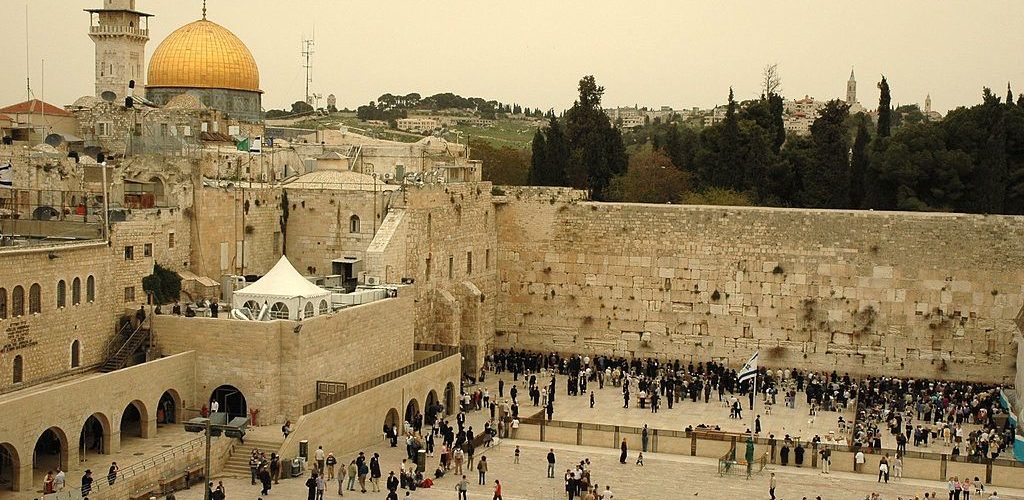Who is the Rightful Owner of the State of Israel?

Who is the rightful owner of the state of Israel?
I will approach this as a Bible question: What does the Bible say about the rightful owner of the state of Israel? Many in the religious world today declare that God unconditionally gave the land of Canaan to the children of Abraham, Isaac, and Jacob/Israel in perpetuity. They argue that God promised it to their descendants forever. For example, Genesis 13:14-15 states: “And the Lord said to Abram, after Lot had separated from him: ‘Lift your eyes now and look from the place where you are—northward, southward, eastward, and westward; for all the land which you see I give to you and your descendants forever.’” The same promise was made to Isaac (Genesis 26:4) and to Jacob (Genesis 35:12). If such a promise were an unconditional promise, then certainly, there would be a biblical case for Abraham’s descendants to have a claim to the land.
However, there are other Bible passages that give conditions upon Israel retaining this land. In Leviticus 18:26-28 God said, “You shall therefore keep My statutes and My judgments, and shall not commit any of these abominations, either any of your own nation or any stranger who dwells among you (for all these abominations the men of the land have done, who were before you, and thus the land is defiled), lest the land vomit you out also when you defile it, as it vomited out the nations that were before you.” Consider also Deuteronomy 28:64 which discusses the consequences of Israel not staying faithful to God: “Then the Lord will scatter you among all peoples, from one end of the earth to the other, and there you shall serve other gods, which neither you nor your fathers have known—wood and stone.” In Deuteronomy 29:24-28 we read more about it.
All nations would say, ‘Why has the Lord done so to this land? What does the heat of this great anger mean?’ Then people would say: ‘Because they have forsaken the covenant of the Lord God of their fathers, which He made with them when He brought them out of the land of Egypt; for they went and served other gods and worshiped them, gods that they did not know and that He had not given to them. Then the anger of the Lord was aroused against this land, to bring on it every curse that is written in this book. And the Lord uprooted them from their land in anger, in wrath, and in great indignation, and cast them into another land, as it is this day.’
In addition to these passages, Jesus comments on the faithfulness of Israel in the New Testament. In Matthew 23:37-38 Jesus said, “O Jerusalem, Jerusalem, the one who kills the prophets and stones those who are sent to her! How often I wanted to gather your children together, as a hen gathers her chicks under her wings, but you were not willing! See! Your house is left to you desolate.” Jesus prophecies about the future of physical Israel in Matthew 24:2, “Do you not see all these things? Assuredly, I say to you, not one stone shall be left here upon another, that shall not be thrown down.” This prophecy was about the destruction of the temple and the end of the Jewish nation. It came true in 70 A.D. when the Roman general Titus destroyed the city of Jerusalem and turned it into a Roman colony. Hadrian named it Aelia Capitolina and dedicated it to the Greek god Zeus. The Jewish temple has not been rebuilt since that time. Jesus’ prophecy does not lead us to believe that God had any intentions to restore the land to physical Israel.
What about the political situation today? The land the nation of Israel has settled today was given to them by the United Nations in 1948 as reparations for the holocaust. It is legally theirs, and they are a strong ally to our nation in that region of the world. This does not mean, however, that God was the One who gave it back to them because they repented. It was merely a political decision. Modern Jews admit that they have no evidence to directly connect them to Abraham. In the book, The Invention of the Jewish People, Shlomo Sand of Tel Aviv University argued that modern Jews did not descend from ancient Israel, but from other groups who took on Jewish identities in the middle ages. All genealogical records from ancient Israel were destroyed in the fire that burned the temple in 70 A.D. Israel today is genealogically unrelated to Israel in the time of Christ. We have no biblical reason to believe that God restored the land of Israel to its “rightful owners,” nor do we have any genealogical reason to believe that today’s owners are the “rightful owners” in a biblical sense.
So, where does the great religious fervor for Jews inhabiting the land of Israel originate? It comes from the religious notion of premillennialism. This is a false doctrine that states that Christ is going to return to the earth and establish a thousand-year reign upon the earth with Him sitting as King on a throne in the physical nation of Israel. When the United Nations gave the land to Israel in 1948, many who believe this doctrine saw it as a sign that the second coming of Christ was about to take place. They continue to argue this today because their doctrine requires the physical nation of Israel to exist for Jesus to return to the earth.
One of the tenets of the doctrine of premillennialism is that God has never fulfilled the Land Promise to Abraham which stated, “To your descendants I have given this land, from the river of Egypt to the great river, the River Euphrates” (Genesis 15:18). Thus, they see control of the land today by modern Jews as the beginning of the fulfillment of that promise. We should note, however, that the Bible says that the promise was fulfilled in the time of Solomon. First Kings 4:20-21 states, “Judah and Israel were as numerous as the sand by the sea in multitude, eating and drinking and rejoicing. So Solomon reigned over all kingdoms from the River to the land of the Philistines, as far as the border of Egypt. They brought tribute and served Solomon all the days of his life.” The “River” mentioned here is the Euphrates. God fulfilled his promise to Abraham in the time of Solomon.
In addition to all this information, we have a prophecy in Jeremiah 31:31-34 about the coming of a time in which God would change the covenants.
Behold, the days are coming, says the Lord, when I will make a new covenant with the house of Israel and with the house of Judah— not according to the covenant that I made with their fathers in the day that I took them by the hand to lead them out of the land of Egypt, My covenant which they broke, though I was a husband to them, says the Lord. But this is the covenant that I will make with the house of Israel after those days, says the Lord: I will put My law in their minds, and write it on their hearts; and I will be their God, and they shall be My people. No more shall every man teach his neighbor, and every man his brother, saying, ‘Know the Lord,’ for they all shall know Me, from the least of them to the greatest of them, says the Lord. For I will forgive their iniquity, and their sin I will remember no more.
The implication of this is that the physical nation of Israel would no longer be a factor in God’s plans. God made this new covenant when Jesus the Messiah died on the cross because it was at that point that the blood of true forgiveness was shed for the sins of God’s people. Hebrews 10:16-18 makes this point that where there is forgiveness, there are no more offerings for sin. The Old Covenant that God made with Israel is obsolete and has been abolished (Ephesians 2:15, Galatians 4:21-31, Hebrews 8:13). All people, both Jews, and Gentiles alike, now live under the New Covenant of Christ and are amenable to His will for salvation (Romans 1:16-17). This means that the physical nation of Israel no longer has any greater spiritual significance than any other nation on the earth, and no biblical mandate exists for anyone to own that land.

